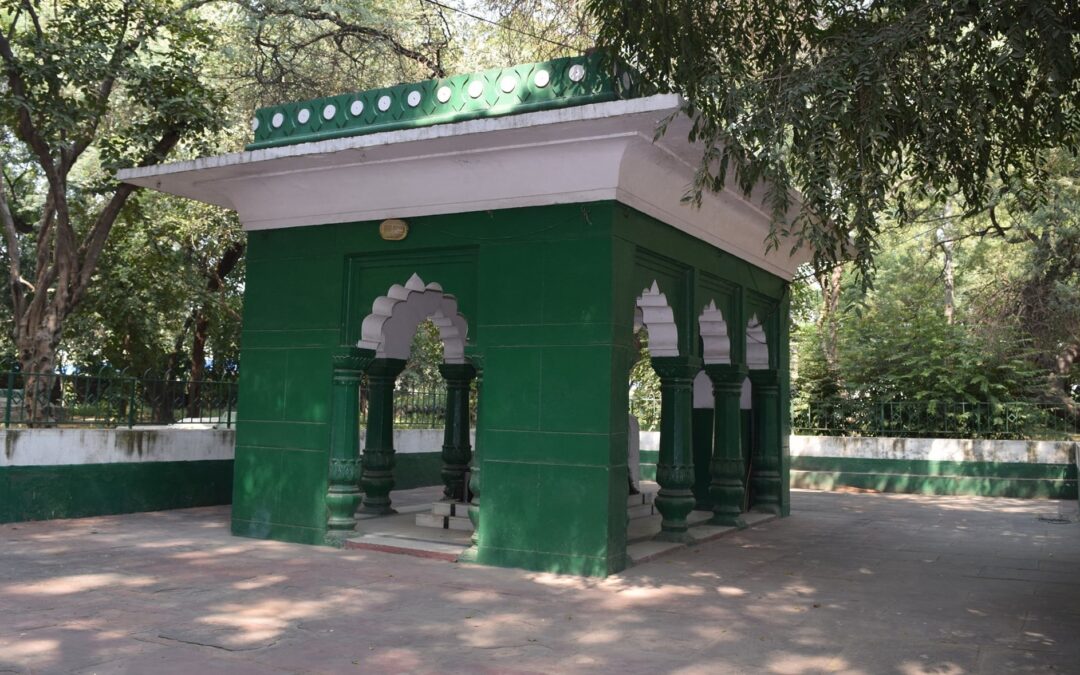Mirza Abdul-Qadir Bēdil ( ابوالمعانی میرزا عبدالقادر بیدل دهلوی)1644–1720)
One of the greatest persian poets of all times, Mirza Abdul Qadir Bedil was born in 1644 in Akbarnagar,(east of Bhagalpur) while most of the earlier scholars have stated Azimabad to be his birth place but a recent research suggests that he was born in Akbar Nagar (Raj Mahal) at the Bengal-Bihar Border where his father resided as his mother was a Bengali.
Born into a Arlas Chughtai Turk family. His father Mirza Abdul Khaliq, a retired soldier, died when he was four years old while his Bengali mother passed away when he was six. Persian was his second language. At the age of ten he finished Quran .His Uncle Mirza Qalandar Baig took very good care of him and sent him to various teachers under whom he studied language, literature, Arabic Grammer , Persian Prose, and traditional subjects.
His father and Uncle were mureed of Shah Kamal Qadri of Rani Sagar near Benaras and Ballia in UP. He too was taken to Shah Kamal Qadri who took him up as his student. Though he was strongly influenced by Islamic mysticism, we cannot say that he confined himself to a particular Tariqa. He has mentioned his meetings with Shah Malook Majzoob of Banaras and a Sufi Shah Fazil and numerous other holy men of India. He was taken to Orissa at the age of 17 by his relative Mirza Zareef where he met a great man of learning Shah Meer Abul Qasim Tirmizi and learned a lot from him as well.
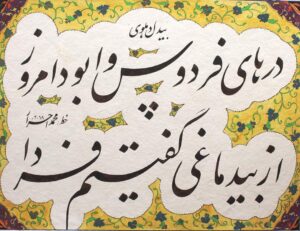
Life
Bedil was a prolific and precocious poet. We find that he travelled throughout his life and met sages and learned men of every religious stream and picked up ideas from the philosophical thought of Hinduism and Buddhism as well.
He started composing poems at the age of ten , he picked up his Pen name (Takhallus) from a line of Shaikh Saadi’s poem in Gulistan, Bedil means heart-less. «بیدل از بی نشان چه جوید باز»
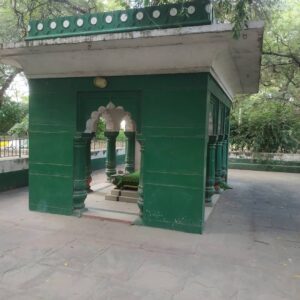
Bedil possessed a unique character .Bedil did not live under any patronage , he lived life on his own terms , after crisscrossing the country, he had finally settled in the Capital Delhi but never tried to visit the court or come nearer to the Emperor , tried his best to escape from the limelight.
He lived mostly in north India from 1075 to 1096 without staying permanently at a place, Agra, Mathura, Delhi were his frequent resorts of refuge. In 1680 he , at the instance of Nawab Shukrullah Khan , moved to the capital for the rest of his life. An Haveli was selected and he spent a freewheeling time there till his death. He married more than once, a son Abdul Khaliq was born in 1120 AH after 41 years of his first marriage but he died before his father.
Maulana Shafi writes that he was proficient in religious sciences as well as Mathematics and Medicine. He was a proficient Hakeem and his prescriptions were in high demand at Delhi.
He stayed for some time with Azam Shah son of Emperor Aurangzeb but one day Azam Shah , after hearing a couplet of Bedil, commented ” Why should a poet be in the royal Army ? , listening this Bedil left the job when the Prince and went to Mathura and pitched his tent on the banks of the river. In a similar incident , he refused to write a Shah Nama even though Emperor Bahadur Shah had ordered the same. Rejecting life as a court poet, he preferred independence as a philosopher poet. One of his students was the first Nizam of Hyderabad , Mir Qamaruddin Khan Bahadur who after settling at Hyderabad, asked Bedil to come over. Bedil sent a couplet to him
If I am given the material world to leave my place of serenity and fulfillment ,I am afraid I am restrained by the Henna of contentment and self reliance applied on my feet.
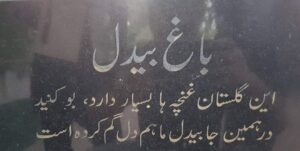
Poetry
Bedil is one of the most outstanding poets of the Persian language, especially the Sabki-i Hindi genre. Sabk-i Hindī is a style of poetry in Persian language, which emerged in 15th century from Indian Sub-continent. He was a Sufi, a Philosopher poet,
Bedil’s main interests are philosophical and metaphysical themes that he weaves in such a captivating but complex metaphors and symbols that it was difficult for Persians to grasp , hence he was not well received in Iran in the early years. He used a convoluted language including many combinations of words which he had coined. In this process he does not lose the crux/message of the composition rather he takes the meaning to its zenith that he is dubbed as Abu-Al-Ma’ani ( Father of poetic meaning )
In order to understand Bedil , One needs to be patient and must learn first the context of similes, symbols, and puns which he had used in a highly intricate form beyond their traditional meanings. He himself says.m
My subtle meanings require acute perception, keeping the trail of my thought is difficult, as I am a mountain with lots of hills
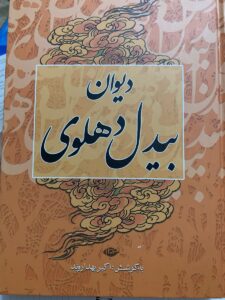
Bedil has a great creative, innovative mind like many great thinkers. Bedil considers this worldly existence as nothing but an illusion: wahm (illusory). He says
A great poet like Ghalib acknowledged the mastery of Bedil in these words.
Both Ghalib and Poet Muhammad Iqbal Lahori were influenced by him and have acknowledged the influence of Bedil on their poetry. Iqbal observed about Bedil that, he, along with Ghalib, taught him “how to remain oriental in spirit and expression after having assimilated foreign ideals of poetry.

Iqbal says
Ibn Arabi influence. An important and a crucial aspect of Bedil’s poetry is the influence of Ibn ʿArabi and the concept of waḥdat al-wujūd, or the Oneness of Being
(Whatever comes out of the world of fantasy, is the shadow of similitude of that lamp)
He dealt with the theme of the ‘unity of existence‘ (In Ibn ’Arabi’s ‘Fusus al-Hikam’) not as a dogmatic principle but in a spiritual way. He expressed this way as ‘ajz (incapacity).
Works
Almost all of Bedil’s works are preserved. He composed 147,000 verses, which were printed as Kullīyāt (collected works) in Kabul between 1962-1965, including three volumes of poetry and one of prose. To name a few Tilism-i Hairat (طلسم حيرت), Tur i Ma’rifat (طور معرفت), Chahār Unsur (چهار عنصر) and Ruqa’āt (رقعات). Gilgisht e Haqiqaat , Irfan , Gul e Zard,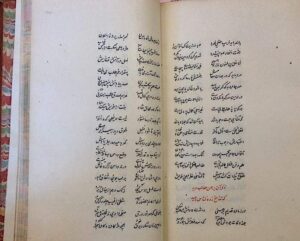
Legacy
Bedil is an icon in Afghanistan, Tajikistan and the entire Central Asia. along with his predecessor Mirza Sa‘ib Tabrizi, he was one of the two greatest exponents of the ‘Indian style’ (sabk-e hindi) of Persian poetry.His revival in Iran must be credited to Famous Iranian Critic Mohammad-Reza Shafiei-Kadkani and Shams Langrudi who brought Bedil into prominence in Iran. Iran also sponsored two international conferences on Bedil
There are societies in Afghanistan , Tajikistan , Uzbekistan for the study on Bedil’s work known as Bedil-Shinasi and the experts are known as Bedil Shinas. His poems are in curriculum of entire Central Asia, Iran, Pakistan and Afghanistan.
His poetry plays a major role in Indo-Persian classical music of central Asia as well. Many Afghan classical musicians, e.g. Mohammad Hussain Sarahang, Ustad Nashanas have sung plenty of Bedil’s ghazals.
It was a tradition in Delhi , that on 3rd of Safar ( month) at the death anniversary of Bedil, the poets, writers and the literati would visit the tomb of Bedil and would organize a poetic symposium where everyone would recite his Kalam.
Tomb
He died in the year of 1720 (4th Safar 1133 AH )at Delhi . His grave, called Bagh-e Bedil (Garden of Bedil) ,situated across the old fort in New Delhi is now a pilgrimage site for his followers of different regions from South Asia to the Middle East and Transoxiana in Central Asia.
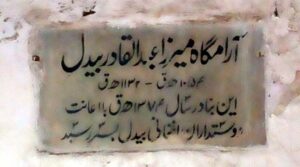
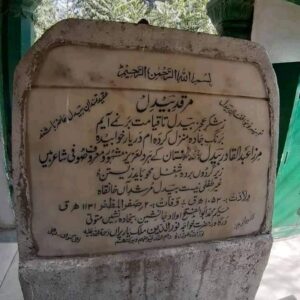
A tablet on his tomb was raised by the Hon. Emomali Rahmon, the president of the Republic of Tajikistan in 2006.
Some of his couplets.
هرکه رفت از دیده داغی بر دل ما تازه کرد
در زمین نرم نقش پا نمایان می شود
whoever left us has actually created a wound in our heart like the soft ground embedded with the footprints
قناعت ساحل امن است افسون طمع مشنو
مبادا کشتي درويش در کام نهنگ افتد
Contentment is a safe side, not to be dodged by avarice Lest the dervish’s ship fall prey to the Whale
One’s worth is measured by the amount of world possessions these days, One is not fit to be called a Man , if he doesn’t have money.
_____________________________________________________
References:
- Abdul Ghani, Life and Works of Abdul Qadir Bedil (Anarkali, Lahore: Publishers United, 1960)
- Moazzam Sidiqi, “An Examination of the Indo-Persian Mystical Poet Mīrzā ʻAbdul Qādir Bēdil withParticular Reference to His Chief Work ʻIrfān.” (PhD diss., University of California, 1975)
- Hajnalka Kovacs, “The Tavern of the Manifestation of Realities: The Masnavi Muhit-i Azam by Mirza Abd Al-Qadir Bedil” (PhD diss., University of Chicago, 2013), 2
- Indo Iranica 1963
- Faruqi, Shamsur Rahman. “A Stranger in the City: The Poetics of Sabk-i Hindi.” The Annual of Urdu Studies, 19 (2004)1-93.
- Bedil by Khwaja Ibadullah Akhtar
- Abdul Qadir Bedil By Syed Athar Sher – Patna 1982
- Mirat ul Wardaat by Muhammad Shafi Waarid 1147 Hijri – Manuscript.
Khalid Bin Umar is a history buff who writes on Micro-history, Heritage, Sufism & Biographical accounts. His stories and articles has been published in many leading magazines. Well versed in English, Hindi, Urdu & Persian, his reading list covers a vast arrays of titles in Tasawwuf & Oriental history. He is also documenting lesser known Sufi saints of India

